Select Language

Gold prices fell in Asian trade on Friday and were headed for steep weekly losses as a trade deescalation between the U.S. and China boosted risk appetite and undermined safe haven demand for gold.
Traders were seen locking in steep profits in gold, as it fell sharply from recent record highs. The yellow metal was also pressured by resilience in the dollar this week, as well as rising U.S. Treasury yields.
Spot gold fell 0.8% to $3,214.90 an ounce, while gold futures for June fell 0.3% to $3,217.65/oz by 01:27 ET (05:27 GMT).
Gold set for worst week since Nov
Spot prices were trading down about 3.2% for the week, their worst drop since early-November 2024, as haven demand for bullion was battered by improving risk appetite.
Washington and Beijing agreed to temporarily slash trade tariffs on each other earlier this week, marking a deescalation in a bitter trade war between the world’s biggest economies.
The agreement spurred hopes for further deescalation, as well as more U.S. trade deals with other major economies. This in turn sparked a sharp rally in risk-driven assets.
Still, the risk-on rally was seen cooling by Friday, while gold still remained well above the $3,000/oz level.
Traders were seen holding out for a more permanent Sino-U.S. deal, while a swathe of weak U.S. economic readings also spurred uncertainty over growth.
Other precious metal prices retreated on Friday, and were also headed for weekly losses. Platinum futures fell 0.5% to $989.90/oz, while silver futures fell 0.3% to $32.593/oz.
Copper ticks lower with more China cues on tap
Among industrial metals, copper prices drifted lower on Friday, but were sitting on some gains this week on optimism over top importer China’s prospects.
Benchmark copper futures on the London Metal Exchange fell 0.2% to $9,567.30 a ton, while U.S. copper futures fell 0.2% to $4.6695 a pound.
A barrage of Chinese economic cues are due next week, starting with industrial production and retail sales data due on Monday.
The People’s Bank of China is then set to decide on its benchmark loan prime rate on Tuesday, with traders speculating over a potential cut as Beijing moves to shore up economic growth.
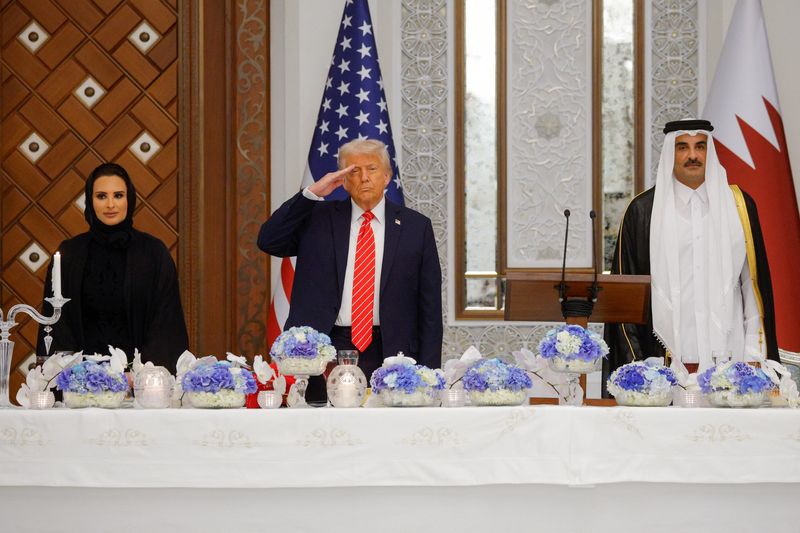
By Gram Slattery, Andrew Mills, Federico Maccioni and Yousef Saba
ABU DHABI (Reuters) -President Donald Trump on Thursday pledged to strengthen U.S. ties to the United Arab Emirates and announced deals with the Gulf state totalling over $200 billion and the two countries also agreed to deepen cooperation in artificial intelligence.
After Trump’s meeting with UAE President Sheikh Mohamed bin Zayed Al Nahyan, the White House said he announced deals that included a $14.5 billion commitment from Etihad Airways to invest in 28 Boeing (NYSE:BA) 787 and 777x aircraft powered by engines made by GE Aerospace.
The U.S. Commerce Department said the two countries also agreed to establish a "US-UAE AI Acceleration Partnership" framework and Trump and Sheikh Mohamed attended the unveiling of a new 5GW AI campus, which would be the largest outside the United States.
Sources have said the agreements will give the Gulf country expanded access to advanced artificial intelligence chips from the U.S. after previously facing restrictions over Washington’s concerns that China could access the technology.
Trump began a visit to the UAE on the latest stage of a tour of wealthy Gulf states after hailing plans by Doha to invest $10 billion in a U.S. military facility during a trip to Qatar.
"I have absolutely no doubt that the relationship will only get bigger and better," Trump said in a meeting with UAE President Sheikh Mohamed bin Zayed Al Nahyan.
"Your wonderful brother came to Washington a few weeks ago and he told us about your generous statement as to the 1.4 trillion," Trump said, referring to a UAE pledge to invest $1.4 trillion in the U.S. over 10 years.
Trump was referring to Sheikh Tahnoon bin Zayed Al Nahyan, Sheikh Mohamed’s brother and the UAE’s national security adviser and chairman of two of Abu Dhabi’s deep-pocketed sovereign wealth funds.
The U.S. president was met at the airport in Abu Dhabi by Sheikh Mohamed, and they visited the Sheikh Zayed Grand Mosque, its white minarets and domes, impressive in the late-afternoon light.
"It is so beautiful," Trump told reporters inside the mosque, which he said had been closed for the day.
"First time they closed it. It’s in honor of the United States. Better than in honor of me. Let’s give it to the country. That’s a great tribute."
$200 BILLION IN NEW DEALS
A White House fact sheet said Trump had secured $200 billion in new U.S.-UAE deals and accelerated the previously committed $1.4 trillion.
It said Emirates Global Aluminum would invest to develop a $4 billion primary aluminum smelter project in Oklahoma, while ExxonMobil (NYSE:XOM) Corp, Occidental Petroleum (NYSE:OXY), and EOG Resources (NYSE:EOG) were partnering with the Abu Dhabi National Oil Company in expanded oil and natural gas production valued at $60 billion.
Sheikh Mohamed told Trump the UAE was "keen to continue and strengthen this friendship for the benefit of the two countries and peoples," adding to Trump: "your presence here today, your excellency, the president, confirms that this keenness is mutual."
Before his departure for the UAE, Trump said in a speech to U.S. troops at the Al Udeid Air Base southwest of Doha that defence purchases signed by Qatar on Wednesday were worth $42 billion.
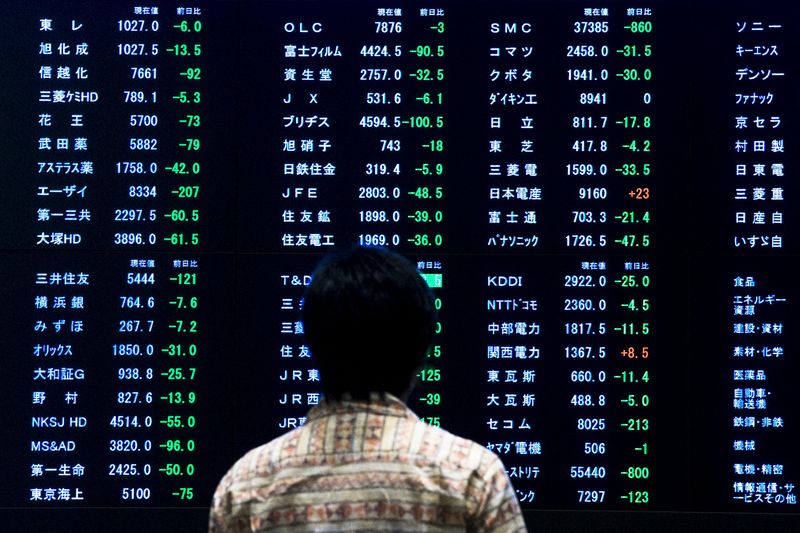
Most Asian stocks moved in a flat-to-low range on Friday with Japanese markets under pressure from substantially weaker-than-expected GDP data, while steep losses in Alibaba pulled down Hong Kong’s Hang Seng.
Regional markets took mixed cues from a middling overnight close on Wall Street, as tech stocks ran out of steam and as other sectors took little support from weaker-than-expected economic prints.
U.S. stock index futures were mildly negative in Asian trade, with S&P 500 Futures down 0.1%.
Still, Wall Street and most Asian stocks were sitting on gains for the week, having rallied sharply on a trade tariff deescalation between the U.S. and China.
Australian stocks also outperformed amid growing conviction that the Reserve Bank will cut interest rates next week.
Nikkei slips as Japan Q1 GDP shrinks more than expected
The Nikkei 225 index shed 0.5%, while the TOPIX index lost 0.3% after gross domestic product data showed Japan’s economy shrank more than expected in the first quarter.
GDP shrank 0.7% year-on-year in Q1, much more than expectations for a drop of 0.2%.
The reading was driven chiefly by softer exports, which faced some disruptions amid increasing U.S. trade tariffs, while local private consumption also remained weak.
Still, the soft GDP data drove up bets that the Bank of Japan will have less headroom to keep raising interest rates, keeping local monetary conditions more accommodative.
Hang Seng down as Alibaba slides on Q4 revenue miss
Hong Kong’s Hang Seng index was the worst performer in Asia on Friday, losing more than 1%.
The index was pressured chiefly by an over 5% drop in Alibaba Group (HK:9988) (NYSE:BABA), after the e-commerce giant clocked softer-than-expected revenue for the March quarter.
Alibaba’s cloud earnings- which are tied to its artificial intelligence ambitions- also missed estimates.
Alibaba rival JD.com (HK:9618) fell 2%, as the e-commerce giant’s earnings raised concerns over sluggish consumer spending in China, which has been tied closely to disinflation in the country.
Videogame developer Netease was an exception among Hong Kong stocks, rallying over 15% on positive first-quarter earnings.
Mainland Chinese markets also retreated. The Shanghai Shenzhen CSI 300 and Shanghai Composite indexes fell about 0.4% and 0.3%, respectively.
Still, Hong Kong and Chinese indexes were trading up between 0.8% and 2% for the week, having rallied sharply on the U.S. and China agreeing to temporarily slash their trade tariffs on each other.
But this rally petered out as investors sought a more permanent solution. Tariffs between the two countries also still remained relatively high.
Broader Asian markets mostly headed lower on Friday, but were set for weekly gains. South Korea’s KOSPI was flat, while Singapore’s Straits Times index shed 0.3%, even as the island state’s key non-oil exports grew much more than expected in April.
Australia’s ASX 200 was an outlier, rising 0.6% to a two-month high as investors bet that the RBA will cut interest rates next week.
Gift Nifty 50 Futures futures for India’s Nifty 50 index pointed to a mildly weak open, after the index rallied to near seven-month highs this week.

By Leika Kihara
TOKYO (Reuters) -Japan’s economy shrank for the first time in a year in the March quarter at a faster pace than expected, data showed on Friday, underscoring the fragile nature of its recovery now under threat from U.S. President Donald Trump’s trade policies.
The data highlights the challenge policymakers face as steep U.S. tariffs cloud the outlook for the export-heavy economy, particularly for the mainstay automobiles sector.
Real gross domestic product (GDP) contracted an annualised 0.7% in January-March, preliminary government data showed, much bigger than a median market forecast for a 0.2% drop. It followed a revised 2.4% increase in the previous quarter.
The decline was due to stagnant private consumption and falling exports, suggesting the economy was losing support from overseas demand even before Trump’s announcement on April 2 of sweeping "reciprocal" tariffs.
"Japan’s economy lacks a driver of growth given weakness in exports and consumption. It’s very vulnerable to shocks such as one from Trump tariffs," said Yoshiki Shinke, senior executive economist at Dai-ichi Life Research Institute.
"The data may lead to growing calls for bigger fiscal spending," he said, adding the economy could contract again in the second quarter depending on when the hit from tariffs intensifies.
On a quarter-on-quarter basis, the economy shrank 0.2% compared with market forecasts for a 0.1% contraction.
Private consumption, which accounts for more than half of Japan’s economic output, was flat in the first quarter, compared with market forecasts for a 0.1% gain.
Capital expenditure increased 1.4% compared with market forecasts for a 0.8% gain, the data showed.
External demand shaved 0.8 percentage point off GDP growth as exports fell 0.6%, while imports rose 2.9%. Domestic demand, by contrast, added 0.7 point to growth.
"Capital expenditure rose probably due to front-loading ahead of Trump tariffs. The economy may avert negative growth in April-June, but will lack momentum," said Takeshi Minami, chief economist at Norinchukin Research Institute.
"If the impact of Trump tariffs is fairly light, the Bank of Japan could raise interest rates again in September or October. But if the tariffs deal a severe blow to capital spending and exports, rate hikes could be put on hold," he said.
A global trade war touched off by U.S. tariffs has jolted financial markets and complicated the BOJ’s decision on when and how far it can push up interest rates.
Having exited a decade-long stimulus last year, the BOJ hiked rates to 0.5% in January and has signaled its readiness to keep hiking borrowing costs if a moderate economic recovery keeps Japan on track to durably hit its 2% inflation target.
But fears of a Trump-induced global slowdown forced the BOJ to sharply cut its growth forecasts at its April 30-May 1 policy meeting, and cast doubt on its view that sustained wage hikes will underpin consumption and the broader economy.
While a de-escalation of U.S.-China trade tensions offered markets and policymakers some relief, there is uncertainty on whether Japan can win exemptions from U.S. tariffs in bilateral trade talks with Washington.
The gloomy GDP data may also pile pressure on Prime Minister Shigeru Ishiba to heed lawmakers’ demands to cut tax or compile a fresh stimulus package.
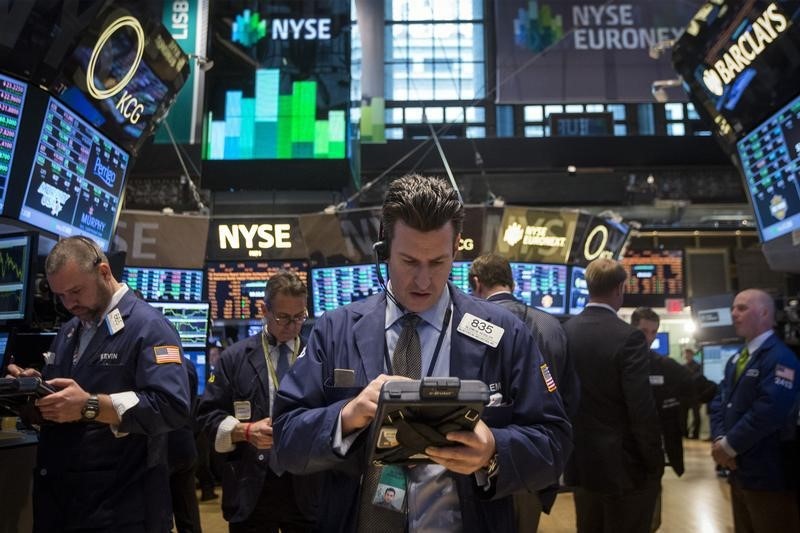
S&P 500 rose Thursday, as softer retail sales data signaling a weaker consumer stoked bets on Federal Reserve rate cuts, pushing Treasury yields lower.
At 4:00 p.m. ET (20:00 GMT), the Dow Jones Industrial Average rose 271 points, or 0.7%, the S&P 500 index added 0.4%, and the NASDAQ Composite slipped 0.2%.
PPI inflation, retail sales slump to amp up rate-cut bets
A duo of economic reports pointing to slower inflation and a weaker consumer helped boost bets on Fed rate cuts, pushing Treasury yields sharply lower.
Yields on the 10-year and rate-sensitive 2-year Treasuries were down sharply as the data are expected to provide the Fed with some relief.
"the cooler-than-expected consumer price and producer price report in April offers some relief for a Fed increasingly concerned about an acceleration in cost pressures, especially as near-term inflation expectations have soared more recently to the highest level since 1981," Stifel said in a recent note.
The latest producer price index showed that factory gate prices slumped on a monthly basis in April, in the latest sign of cooling inflationary pressures.
The producer price index for final demand fell 0.5% in April, the first monthly fall since 2023, after the previous month’s figure was revised to flat from a fall of 0.4%.
Taking out more volatile items like fuel and food, so-called “core” PPI also fell on a monthly basis, down 0.4%.
Data released earlier this week showed that the more widely-watched consumer price index grew by 2.3% in the 12 months to April, compared with expectations that it would match March’s pace of 2.4%.
It was the lowest annual rate of inflation since February 2021, shortly before pent-up pandemic-fueled demand and supply constraints led to soaring prices.
Additionally, retail sales fell 1.0% on the month in March, a more substantial loss than the 0.5% expected.
A surge of buying before the implementation of Trump’s punishing tariffs led to the largest increase in the metric in more than two years in March. Separate surveys have indicated that households have widely been anticipating that the levies will push up prices.
Walmart impresses in Q1
The main corporate release Thursday comes from retail giant Walmart (NYSE:WMT), with the retail giant posting better-than-anticipated first-quarter earnings, although its finance chief warned that tariff tensions could soon drive prices higher..
Known for its low prices and massive selections, Walmart has become something of a bellwether for shopper sentiment. In February, the company issued downbeat guidance for the year, although CFO John David Rainey said American consumers remain "resilient" and focused on value.
Elsewhere, Chinese e-commerce titan Alibaba (NYSE:BABA) missed earnings expectations for its fiscal fourth quarter on both the top and bottom line, while agricultural equipment manufacturer Deere & Company (NYSE:DE) reported better-than-expected second quarter results, but lowered the bottom end of its full-year net income forecast range amid challenging market conditions.
Cisco Systems (NASDAQ:CSCO) raised its annual results forecast, betting on steady demand from cloud customers for its networking equipment, driven by the artificial intelligence boom.
UnitedHealth (NYSE:UNH) stock slumped after the Wall Street Journal reported the company was being investigated by the Department of Justice over alleged criminal fraud involving Medicare.
The investigation marks a new headwind for UnitedHealth, which is already nursing a sharp selldown in its shares this year on concerns over government scrutiny, weakening financials, and signs of internal strife. The company abruptly replaced its CEO this week.
Foot Locker (NYSE:FL) stock soared after Dick’s Sporting Goods (F:DKS) confirmed it is exploring a deal to buy the company for roughly $2.3 billion.
(Ambar Warrick and Peter Nurse contributed to this article)

Gold prices fell to a one-month low in Asian trade on Thursday, extending a recent run of losses as a recent deescalation in the U.S.-China trade war boosted risk and undermined demand for safe havens.
The yellow metal was pressured by resilience in the dollar, as the greenback drew bids before more U.S. economic data, as well as an address by Federal Reserve Chair Jerome Powell later on Thursday. A spike in Treasury yields also weighed.
Spot gold fell 1.1% to $3,141.35 an ounce, while gold futures for June fell 1.4% to $3,143.67/oz by 01:09 ET (05:09 GMT).
Gold remains fragile following US-China trade deescalation
Gold prices remained on the backfoot after the U.S. and China drastically reduced their trade tariffs against each other this week, sparking a rally in risk-driven assets and undermining haven demand.
While this rally was seen cooling by Thursday, gold still remained under pressure, especially considering it soared to record highs last week.
Still, gold remained comfortably above the $3,000/oz level- a level it had taken in April amid heightened concerns over the economic impact of a Sino-U.S. trade war.
While Washington and Beijing did announce some deescalation this week, relatively high tariffs still remained in place.
Markets were now looking to more tariff pullbacks between the economic giants, while U.S. trade talks with other countries were also in focus for more positive cues.
Broader precious metals fell on Thursday in tandem with gold, and were also nursing recent losses. Platinum futures fell 0.5% to $977.10/oz, while silver futures slid 1.6% to $31.915/oz.
Among industrial metals, benchmark copper futures on the London Metal Exchange fell 0.7% to $9,524.95 a ton, while U.S. copper futures fell 0.8% to $4.6085 a pound.
US econ. data, Powell speech in focus
Focus was now squarely on a swathe of upcoming U.S. economic readings, as well as an address by the Fed’s Powell, for more cues on the world’s biggest economy.
Producer price index inflation data for April comes just days after a softer-than-expected consumer price index reading. A sustained decline in inflation is expected to boost bets on more Fed rate cuts this year.
U.S. retail sales data is due on Thursday, offering up more cues on retail spending in the face of a Sino-U.S. trade war.
Fed Chair Powell is also set to speak later in the day, after the central bank kept interest rates unchanged last week and warned that it was not looking to lower rates in the near-term.
Powell is expected to talk on the monetary policy framework, the blueprint the Fed uses to decide on its goals of maximum employment, price stability, and interest rates.
Beyond the U.S. data, Japanese gross domestic product is also due on Friday.
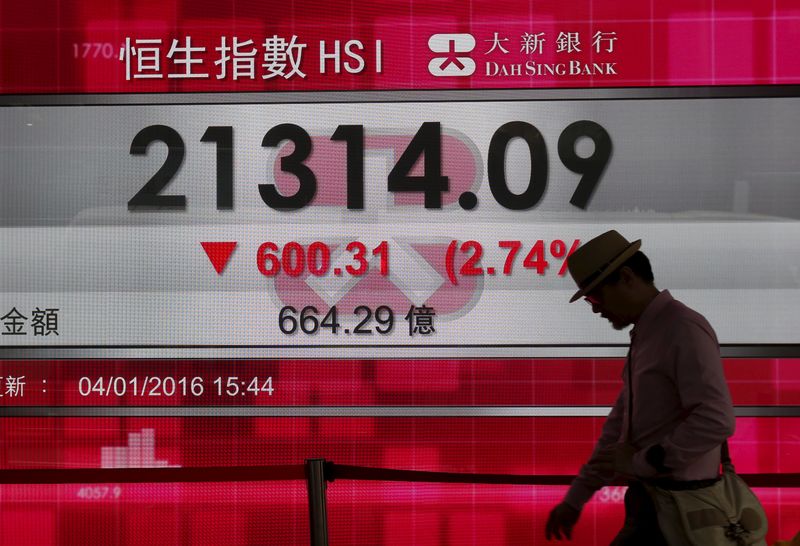
German container shipping firm Hapag-Lloyd earlier on Wednesday said its bookings were up 50% for U.S.-China traffic week on week in the first few days of this week.
When asked about Washington and Beijing’s tariff truce, CEO Rolf Habben Jansen told Reuters: "I expect that there will be additional volume between China and the U.S. That is what we have already seen in the last feMost Asian markets retreated on Thursday after a strong, tech-led run-up over the past four sessions now appeared to be cooling, with investors now awaiting key earnings from Chinese internet giant Alibaba .
Cheer over a U.S.-China trade deal also appeared to be easing, given that trade tariffs between the two countries still remained relatively high. Focus was now on a further deescalation in tariffs, as well as U.S. trade deals with other major Asian economies.
Regional markets took middling cues from a mixed overnight close on Wall Street, as sectors outside tech lost momentum. U.S. stock index futures fell slightly in Asian trade, with focus also turning to an upcoming address by Federal Reserve Chair Jerome Powell later in the day.
S&P 500 Futures fell 0.1% in Asian trade.
Asia tech rally cools, Alibaba earnings in focus
Tech-heavy Asian bourses mostly retreated on Thursday after strong gains earlier this week, which were in part driven by optimism over a U.S.-China trade deal and assurances that artificial intelligence demand remained robust.
South Korea’s KOSPI shed 0.1%, while Hong Kong’s Hang Seng index traded sideways.
HK-listed shares of Alibaba Group (HK:9988) (NYSE:BABA) rose 0.5% before the internet giant’s March quarter earnings. The e-commerce giant is expected to have benefited from improving Chinese consumer spending, as well as increasing local demand for its cloud unit.
Alibaba peer Tencent Holdings Ltd (HK:0700) rose 0.5% after its first-quarter revenue jumped 13% on strength in its gaming and advertising units, both of which were bolstered by AI. w days."
Asian AI-linked stocks took some negative cues from Nvidia-backed cloud major Coreweave, whose stock slid 15% in aftermarket trade after it warned that higher AI-related expenses will weigh on its margins in the coming quarters.
But tech shares were still sitting on strong gains this week, driven by bets that improving U.S.-China trade relations will herald fewer disruptions for the sector.
China’s Shanghai Shenzhen CSI 300 and Shanghai Composite indexes fell between 0.2% and 0.5%, but were trading up as much as 2% for the week.
Japan shares drop ahead of GDP data
Japanese stocks were the worst performers in Asia, pressured by some caution before key first-quarter gross domestic product data due on Friday.
The Nikkei 225 fell 1.1%, while the TOPIX shed 1%, with the indexes also dented by losses in tech stocks.
GDP data is expected to show a contraction in the first quarter, as local businesses were hit by weak private spending and heightened global trade uncertainties. Strong capital spending, however, is expected to have offset this trend.
Japanese growth is expected to pick up later this year, especially as springtime labor negotiations yielded another year of bumper wage hikes.
Broader Asian markets were mostly muted on Thursday. Australia’s ASX 200 rose 0.1% following a substantially stronger-than-expected labor market report for April, which showed the labor market remained strong.
Strength in the labor market gives the Reserve Bank of Australia less impetus to cut interest rates further, with Thursday’s reading sparking increased uncertainty over a RBA meeting next week.
Singapore’s Straits Times index rose 0.4%, while Gift Nifty 50 Futures for India’s Nifty 50 index fell 0.2%, pointing to a soft open. Indian markets had also rallied this week as a recent ceasefire with Pakistan appeared to be holding.

LOS ANGELES (Reuters) -U.S. bookings for container transport from China to the United States spiked almost 300% in the wake of the United States and China pausing punishing tit-for-tat tariffs, container-tracking software provider Vizion said on Wednesday.
The average bookings for the seven days ended Wednesday soared 277% to 21,530 20-foot equivalent units from 5,709 TEUs for the average for the seven days that ended on May 5, said Ben Tracy, the company’s vice president of strategic business development said.
U.S. importers slammed the brakes on shipments after April 2, when Trump announced plans to slap 145% tariffs on goods made in China.
That trade restarted after the United States and China on Monday announced a 90-day thaw in their bruising trade war.
The United States said it would reduce tariffs it imposed on Chinese imports in April to 30% from 145%, while China reduced duties on U.S. imports to 10% from 125%.
"We are definitely starting to see the bookings return now that this temporary pause is in effect," Tracy said.
German container shipping firm Hapag-Lloyd earlier on Wednesday said its bookings were up 50% for U.S.-China traffic week on week in the first few days of this week.
When asked about Washington and Beijing’s tariff truce, CEO Rolf Habben Jansen told Reuters: "I expect that there will be additional volume between China and the U.S. That is what we have already seen in the last few days."
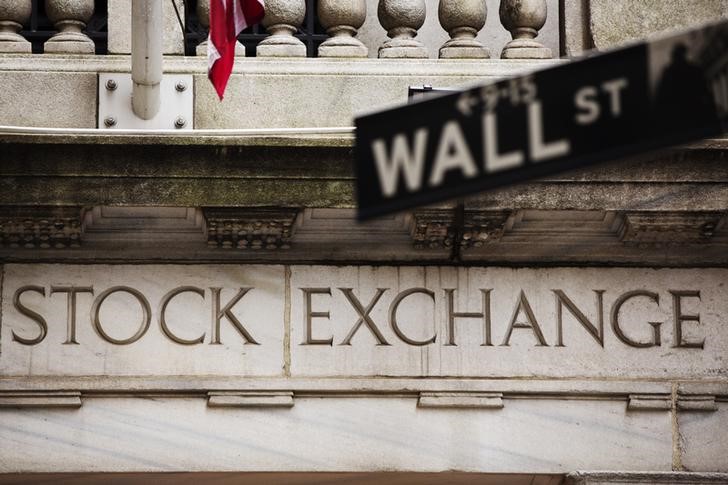
The S&P 500 eked out a gain Wednesday, led by tech, a day after turning positive for the year amid ongoing optimism surrounding the U.S.-China trade deal.
At 4:00 p.m. EDT (20:00 GMT), the Dow Jones Industrial Average fell 89 points, or 0.1%, the S&P 500 index rose 0.2%, and the NASDAQ Composite added 0.7%.
Markets await updates on trade deals, but tech continues shine
The breather in the recent rally comes as investors continue to pour over any further details on the trade policy front. National Economic Council Director Kevin Hassett said President Trump could announced a major trade deal when he returns from his Middle East tour. Trump has already secured a $600 billion commitment from Saudi Arabia to invest in the U.S.
Additionally, Reuters reported that the Trump administration will slash the so-called "de minimis" tariff on low-value imported packages from China to as low as 30%.
On Monday, the White House unveiled an executive order bringing down the duty on these direct-to-consumer packaged items valued at $800 or less to 54% from 120%, adding to optimism spurred on by an earlier trade truce between Washington and Beijing. A flat fee of $100 remained in effect, although a planned increase to $200 in June was scrapped.
Tech stocks, however, remained in ascendency, led by Alphabet Inc Class A (NASDAQ:GOOGL), Advanced Micro Devices Inc (NASDAQ:AMD), and NVIDIA Corporation (NASDAQ:NVDA), with the latter two supported by ongoing signs of chip demand after notching chip deals with Saudi-based Humain,
Elsewhere in chips, Super Micro Computer Inc (NASDAQ:SMCI) extended its rallied just days after Raymond James initiated coverage on the stock with an outperform rating, citing long-term AI-led server demand. The company also announced a multi-year, $20 billion partnership with Saudi data center firm DataVolt.
Fed speak continues
The U.S. economic data slate is largely empty Wednesday, but a number of Fed officials delivered remarks touting concerns about a tariff-related drag on the economy.
Fed Vice Chair Philip Jefferson said on Wednesday the outlook on inflation slowing toward the 2% target had been clouded by the impact of tariffs, citing the risk of new import taxes driving inflation higher.
Remarks from Fed officials will be closely watched at a time when bets on the Fed cutting rates three to four times this year remain intact.
“So while the de-escalation of trade tensions is helpful for growth, it also makes it more likely that inflation will be less of an issue for the Federal Reserve and the scope for Fed rate cuts remains,” ING analysts said in a note.
ING still expects the Fed to wait until September to cut rates, but said a cut of 25 basis points seems more likely now than the previously anticipated 50 bps.
Cisco earnings in spotlight
Highlighting the earnings calendar on Wednesday will be quarterly results from Cisco Systems (NASDAQ:CSCO), with analysts curious to see how the technology equipment firm views the impact from U.S. duties on its finances.Elsewhere in chips, Super Micro Computer Inc (NASDAQ:SMCI) extended its rallied just days after Raymond James initiated coverage on the stock with an outperform rating, citing long-term AI-led server demand. The company also announced a multi-year, $20 billion partnership with Saudi data center firm DataVolt.
Fed speak continues
The U.S. economic data slate is largely empty Wednesday, but a number of Fed officials delivered remarks touting concerns about a tariff-related drag on the economy.
Fed Vice Chair Philip Jefferson said on Wednesday the outlook on inflation slowing toward the 2% target had been clouded by the impact of tariffs, citing the risk of new import taxes driving inflation higher.
Remarks from Fed officials will be closely watched at a time when bets on the Fed cutting rates three to four times this year remain intact.
“So while the de-escalation of trade tensions is helpful for growth, it also makes it more likely that inflation will be less of an issue for the Federal Reserve and the scope for Fed rate cuts remains,” ING analysts said in a note.
ING still expects the Fed to wait until September to cut rates, but said a cut of 25 basis points seems more likely now than the previously anticipated 50 bps.
Cisco earnings in spotlight
Highlighting the earnings calendar on Wednesday will be quarterly results from Cisco Systems (NASDAQ:CSCO), with analysts curious to see how the technology equipment firm views the impact from U.S. duties on its finances.
Elsewhere, American Eagle Outfitters (NYSE:AEO) stock slumped after the clothing retailer withdrew its outlook for the year after posting disappointing preliminary first-quarter results.
Ford (NYSE:F) stock fell with the auto giant having to recall over 273,000 vehicles in the United States as a loss of brake function may increase the risk of a crash.
Peter Nurse, Ayushman Ojha contributed to this article.

By Maggie Fick
LONDON (Reuters) -European governments are examining whether U.S. President Donald Trump can force them to pay more for prescription medicines, after he issued an executive order to lower U.S. drug prices, roiling the global pharmaceutical industry.
On Monday, Trump took aim at governments paying a fraction of what Americans have to shell out for their medicines, and directed the use of trade policy to force other nations to pay more for prescription drugs.
The Trump administration wants to reduce the gap between U.S. drug prices and those in other developed countries such as many in Europe, where prescription drugs cost, on average, one-third what they do in the United States.
Denmark’s industry and business minister Morten Bodskov plans to meet with drugmakers based in his country to discuss the order. He did not give details about the meeting.
"The uncertainty (caused) by the U.S. is bad for the world," he told Reuters. "Danish pharmaceutical companies are among the best in the world and are of great importance to Denmark. The message from Trump does not change that."
The country of six million has benefited from the expansion of Novo Nordisk (NYSE:NVO) and the outsize demand for its diabetes drug Ozempic and for Wegovy, one of the powerful new weight-loss drugs singled out by Trump in his push to lower prices.
Novo, Europe’s third-largest listed company worth 265 billion euros ($295.74 billion), said it looked forward to the meeting.
In the U.S., drug prices are shaped by complex negotiations involving pharmacy benefit managers that act as middlemen between drugmakers and employer clients and health insurers and have been criticised for inflating costs. In Europe, countries generally have public health systems that negotiate directly with manufacturers and keep costs down.
The European Commission, the EU executive, will assess the impact of Trump’s order on European companies, a spokesperson told reporters on Tuesday.
"We know the pharmaceutical industry faces challenges both in the U.S. and the EU," the spokesperson said, noting Commission President Ursula von der Leyen had met with executives last month to address concerns about the threat of U.S. tariffs on medicines.
Trump’s effort during his first term -- through a more limited executive order focused on certain drugs covered by the government’s Medicare program -- was blocked by a court.
Trump said if drugmakers do not cut prices they could be hit with tariffs. His administration launched a probe last month into pharmaceutical imports as a potential precursor to placing levies on medicines on national security grounds.
"The United States will no longer subsidize the healthcare of foreign countries, which is what we were doing," Trump said on Monday. "I’m not knocking the drug companies. I’m really more knocking the countries than the drug companies."
Although Americans pay significantly more for medicines, they have access to a greater number of treatments. Some 55% more cancer drugs were launched in the U.S. than in the UK over the past three decades, according to a 2024 study in the British Medical Journal.
An AstraZeneca (NASDAQ:AZN) spokesperson said the company supports fairer global sharing of pharmaceutical costs, but that changes must avoid "disrupting patient care, undermining U.S. biotech leadership, or stifling innovation."
CONFIDENTIAL PRICES
Seven drug pricing experts and lawyers told Reuters it is unclear how the administration could legally demand confidential contract details between drugmakers and governments. That information would be needed as Trump’s order calls for giving drugmakers price targets within a month.
Strict cost containment measures and reimbursement policies prevent drugmakers from charging Britain’s financially strapped state-funded National Health Service more for new drugs, said Daniel Howdon, a health economist at the University of Leeds.
"Unless there is some sort of overhaul of UK law or policy, Trump’s order will not be able to achieve higher prices," he said.
A spokesperson for Germany’s health ministry told Reuters it was not possible to predict how the U.S. order may be implemented.
Germany has a "clearly defined framework for price negotiations on medicines between statutory health insurance and the pharmaceutical industry," the spokesperson said.
The call for developed countries to pay more for drugs so the U.S. can pay less comes as worries grow that uncertainty caused by Trump’s whiplash trade war will dampen the 27-nation bloc’s already-weak economy.
Even with the threat of tariffs, governments may be unable and unwilling to spend more on medicines, particularly as populations age and healthcare budgets tighten, UBS analyst Trung Huynh said.
The UK government does not publish the prices it pays for NHS drugs, but a source at the UK’s Department of Health and Social Care said prices for some treatments are about a quarter of those paid by the U.S.
The DHSC did not respond to a request for comment.
Still, a source at a European drugmaker told Reuters the Trump administration could still exert pressure to try to force governments to alter their longstanding pricing practices embedded in national health systems.
"I read this as him showing pharma all of the negotiating tools he has at his disposal," said Anna Kaltenboeck, a health economist at Verdant Research, "and giving them some credible threat based on his willingness to impose tariffs so far."
($1 = 0.8961 euros)

